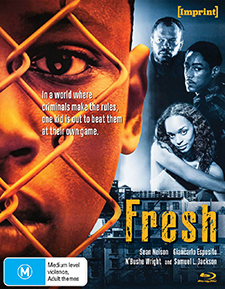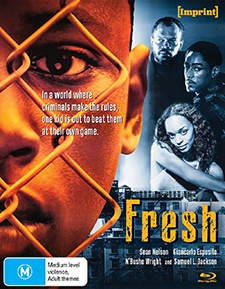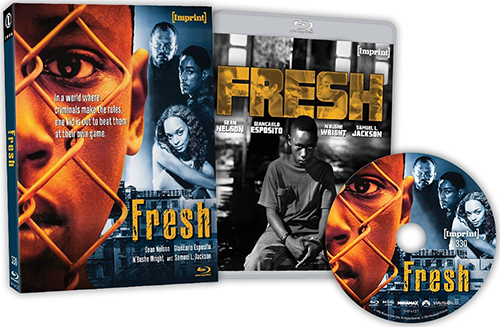Fresh (1994) (Blu-ray Review)

Director
Boaz YakinRelease Date(s)
1994 (July 3, 2024)Studio(s)
Miramax Films (Imprint Films/Via Vision Entertainment)- Film/Program Grade: A
- Video Grade: A
- Audio Grade: A
- Extras Grade: A+
Review
[Editor’s Note: This is a Region-Free Australian Blu-ray import.]
Child movie actors such as Elizabeth Taylor (National Velvet), Roddy McDowall (Lassie Come Home), and Dean Stockwell (The Boy With Green Hair) were at their heyday during the Golden Age of Hollywood, when minorities were seldom cast as leads. Made in 1994, Fresh stars a very different kind of child, an African-American boy who makes money working for drug dealers and endures an existence no child should.
Fresh (Sean Nelson, American Buffalo) a 12-year-old boy in Brooklyn, New York, works for crack dealers and local heroin big shot Esteban (Giancarlo Esposito, The Usual Suspects). Because he’s honest and smart, they respect him. He has a good relationship with Esteban, who looks with pride on Fresh, regarding him almost like a son.
Fresh and many other children live with his aunt in her apartment. She’s kind but helpless against the dangers of the streets. Fresh has a father, but sees him only rarely. His father (Samuel L. Jackson, Pulp Fiction), lives in a trailer and supports himself by hustling speed chess games in the park. His sister, Nichole (N’Bushe Wright, Dead Presidents), has left their aunt’s apartment to live with Esteban. Her days are one extended drug haze.
Fresh longs to escape the life he’s leading and save his sister. To fund his dream, Fresh stashes wads of cash in a tin can in a remote place. But circumstances force him to make a detour that brings him face to face with extremely dangerous types.
Fresh is a dark coming-of-age drama. We see Fresh make thoughtful decisions, unlike the hotheaded community of drug dealers in his neighborhood. With little dialogue, the young actor lets his expressive face and body do the work, conveying Fresh’s thoughts and reactions as he makes his way through a not-easy life.
Despite his criminal associations, Fresh is still a kid, trying to get to school on time, cowering when his teacher reprimands him for lateness, and eager to get the attention of a pretty girl. His best friend, Chuckie (Luis Lantigua), is a smart-mouthed kid who spouts profanities and carries a big chip on his shoulder. The opposite of Fresh, Chuckie’s impulsive, doesn’t weigh the consequences of his actions, can’t refrain from angering the wrong people, and never backs away from potential danger.
When a fatal shooting interrupts a schoolyard basketball game, everyone flees except Fresh. He tells the police he saw nothing, but the murder marks a decisive point in his life and he devises an elaborate scheme to set the record straight and see that those who have done bad things are duly punished. Though the script makes this plan extremely complex, we buy into it because Fresh has been established as intelligent and he knows the personalities involved intimately. So he’s like an insider strategist, rooting out evil within a community he’s part of.
Young Sean Nelson is excellent as the title character. Director Boaz Yakin uses many close-ups to let us see what Fresh is thinking, planning, responding to. The spareness of his dialogue makes Nelson’s job tougher, as he must almost wordlessly make the audience aware of Fresh’s state of mind. An additional challenge for the actor is that Fresh is of necessity a stoic character, rarely showing emotion. Other characters must not suspect what goes on in his mind but we, the viewers, have to know, and Nelson does an extraordinary job of showing us.
Jackson convinces as Sam, Fresh’s somewhat estranged father, who uses chess pieces as metaphors to teach Fresh some life lessons. In these matches, Fresh is a worthy competitor to his father.
Writer/director Yakin managed to capture the milieu of a subculture he was never personally involved in, where young kids are recruited into drug-related crime. The film has an authenticity and never seems contrived. Yakin also knows how to create colorful, believable characters. Some of them border on cliche, but the director gives them so much depth that they never become caricatures of evil. Though the story is clearly placed in an impoverished New York City neighborhood, it has a universality that expands its appeal. The director avoided period-defining touches, such as loud hip-hop music and 1990s-specific clothing and hairstyles, to give the picture a sense of timelessness. The string-heavy Stewart Copland score, comprised mostly of emotional chords, has a wrenching, bittersweet quality that complements the film’s theme.
Fresh was shot by director of photography Adam Holender on 35 mm film with Moviecam Compact and Panavision Panaflex Gold II cameras, both with Panavision Primo lenses, and presented in the aspect ratio of 1.78:1. For the Blu-ray, clarity and contrast are excellent. Details, such as a cyclone fence, overgrown weeds on train tracks, stubble on men’s faces, clothing, neighborhood stores, and elevated subway are well delineated. There are no perceptible visual imperfections to impede enjoyment. Color palette is broad, ranging from darker tones when Fresh is confronted by drug dealers to lighter, brighter hues in the schoolyard where Fresh and Chuckie hang out. A pre-credit sequence in which a cityscape forms building by building establishes the film’s urban setting.
The soundtrack is English 2.0 LPCM. English SDH subtitles are an available option. Dialogue is clear and distinct and often mixed with ambient street noise. Key sound effects include subway trains passing overhead, sounds of a person being beaten offscreen, car engines, gun shots, and a squad of cheerleaders practicing. Stewart Copland’s score is entirely instrumental and conveys a sort of melancholy tone. It’s simple structure is a good fit for the story.
Bonus materials on the Region-Free Blu-ray release from Imprint Films include the following:
- Audio Commentary by Boaz Yakin
- The Rookie: Director Boaz Yakin on Creating a Timeless First Film (22:59)
- Fresh on Fresh: Actor Sean Nelson on the Prodigy He Played (13:57)
- Framing Fresh with Cinematographer Adam Holender (13:10)
- Fresh Sounds: Composer Stewart Copland on the Unconventional Score of Fresh (16:18)
- One Foot in the Practical, One Foot in the Poetic: Lawrence Bender on the Producer’s Role (16:25)
- Archival Interview with Samuel L. Jackson (6:30)
- Archival Interview with Giancarlo Esposito (5:58)
- Archival Interview with Sean Nelson and N’Bushe Wright (6:28)
- Behind-the-Scenes Featurette (2:16)
- Storyboard to Film Comparisons (19:36)
- Cast Audition Tapes (33:13)
- Gag Reel (4:57)
- Theatrical Trailer (2:23)
Audio Commentary – Director Boaz Yakin was a screenwriter for years before making his first film, Fresh. He wanted to make a film about a character who had to face obstacles. He was living in Paris and trying to write the Great American Novel when he connected with Lawrence Bender, who agreed to produce a low budget film that Yakin could direct. Fresh includes some surrealistic touches in a realistic film in order to express the inner experiences of a human being. Yakin collaborated with composer Stewart Copland to come up with a melancholy score that avoided musical cliches about Black characters. Yakin attempted to portray moments that reflect the relationship of Fresh, a city kid, to his environment. Films featuring African American characters at the time had a loud, shouting style of performance, but Yakin strove for a quiet, introspective tone. Tension had to be felt as Fresh navigated the mean streets. In the chess scenes, the dialogue was coordinated with the chess moves as Fresh’s father offers him tough love advice. Rather than build up to violent scenes to escalate suspense, Yakin wanted the violence to be quick and unexpected. He believes that the actor who knows how to listen often draws the most attention. He quotes his acting teacher, Stella Adler, whose theory was, “The great actors always know how to leave something out. Never give 100%.” What’s left out makes the character mysterious. Actors like Meryl Streep, Steve McQueen, and Clint Eastwood leave you feeling you want to know more about them. Many films are made without allowing for rehearsal time. For Fresh, a few weeks were allocated for rehearsals because the film is about characters who have known each other for a while. Yakin has made big-budget films, which pose demands that are exponentially greater than those of an independent production. For his plan to succeed, Fresh has to harden himself to destroy the last remaining innocence in his heart. Yakin speaks about the disastrous first cut of the film, which didn’t have enough footage of Sean Nelson. Yakin restored footage of Fresh observing, listening, and reacting. Yakin notes that happy sets ironically often result in bad movies and troubled sets often result in good movies. About Fresh’s elaborately contrived plan, Yakin notes, “he’s playing the hand he has been dealt.”
The Rookie: Director Boaz Yakin on Creating a Timeless First Film – Yakin’s parents were mimes and he grew up surrounded by theater. He was later inspired to make films and wrote The Rookie, which was made into a film starring Clint Eastwood, who also directed. Yakin was impressed with Eastwood’s directing style. He learned how Eastwood ran a set. He doesn’t over-prepare. Yakin notes, “The world of Fresh is not really my world,” yet he felt confident making it. The chess games are an external metaphor for what the main character was internalizing. Violence breaks out without a build-up or suspenseful lead-in. It’s sudden and quick. Yakin wanted to give the film a classic sensibility, with nothing that screamed “the 90s,” and he feels it has a timeless quality.
Fresh on Fresh: Actor Sean Nelson on the Prodigy He Played – Nelson started acting when he was 10. He attended a performing arts school and took singing, dancing, and piano lessons. He did a lot of auditioning and had to learn to tone down his performance style for TV and film. He was called back four or five times before he was told he had the role in Fresh. He related to the character because he came from a home with lots of children. He was disappointed that he wasn’t dressed to look like the cliche drug dealer with lots of gold chains. Samuel Jackson was on set for only a week, while Nelson filmed for two months. Nelson speaks in detail about his crying scene, his brief nude scene, and a scene with a dog.
Framing Fresh with Cinematographer Adam Holender – Holender gravitated toward cities. He was born in Poland, started studying architecture, then discovered photography and film. He studied the craft of filmmaking for five years and then started his career. He was well prepared to work in America, but learning English took time. He had to adapt to the American way of making movies. He feels effective communication is essential in dealing with different directors. He directed one film but didn’t like directing and returned to cinematography. When he read the script of Fresh, he assumed the writer was African American. Locations were scouted “all over the place.” Holender feels a good screenplay is the passport to a good set.
Fresh Sounds: Composer Stewart Copland on the Unconventional Score of Fresh – Copland, formerly of the rock group The Police, talks about his musical education. Francis Ford Coppola asked Copland to write the score for Rumble Fish. The score he wrote had a hungry feel that Coppola liked, but he felt it needed strings. Copland did a lot of TV work and enjoyed the speed with which he had to deliver completed scores. There was no time to think. He regards the film composer as a craftsman—a “hired gun”—in service to the tone of the film and the director’s vision. Fresh was a film “out of its genre.” The music had to underscore the gentle soul of the boy. “It’s all about the director’s singular vision.”
One Foot in the Practical, One Foot in the Poetic: Lawrence Bender on the Producer’s Role – Bender started as a dancer with a ballet company. An injury ended his dance career, so he turned to acting. He started on movie sets in minor capacities and worked his way up to his ultimate goal: becoming a producer, a job that combines the technical with the artistic. As a producer, he had to know what each person on the set does. He worked on Reservoir Dogs and felt he was in a position to help Boaz Yakin direct a film. Fresh was a tough sell but was ultimately financed by a French company. Bender points out that with a small budget, careful preparation is a must.
Archival Interview with Samuel L. Jackson – In this brief interview from 1994, Jackson says he made up his own backstory for Fresh’s father, and talks about the significance of the various chess pieces. Jackson also offers his opinion of the war on drugs, which seems unwinnable. The film shows that younger kids are being recruited into the drug world.
Archival Interview with Giancarlo Esposito – In this 1994 interview, Esposito talks about Esteban’s atypical nature as a drug dealer. He can be tender with Fresh. He has to be likable on one level and despicable on another. Esposito wanted to make Esteban an original, and says he enjoyed working with Sean Nelson, who was thoroughly professional on set. He says that conveying emotion non-verbally is difficult even for a veteran actor.
Archival Interview with Sean Nelson and N’Bushe Wright – Recorded in 1994, this interview pairs the two young actors. Wright talks about losing weight, visiting a methadone clinic and doing relaxation exercises to prepare for her role as Fresh’s drug-addicted sister. Nelson had an acting coach. For his audition, he did a scene and then some ad-libbing. He hopes the film will open the eyes of kids who have easy lives to a very different kind of childhood. He speaks about how tempting the money can be to folks who don’t have much. Sometimes they get into drugs to help their families. For the crying scene, director Yakin told Nelson to think about something that really disturbed him.
Behind-the-Scenes Featurette – In this fast paced short film, the stars of the film provide sound bites, and brief scenes of the making of Fresh are shown.
Storyboard to Film Comparisons – Storyboards are shown at the top of the screen with corresponding film scenes below. The scenes include Rosa, Dope House, Train Tracks, Basketball, Dog Fight, Chuckie’s Death, and Esteban.
Cast Audition Tapes – Footage of videotaped auditions of the following actors are shown: Sean Nelson, Luis Lantigua, Natime Bradley, Ron Brice, Jean LaMarre, N’Bushe Wright and Iraida Polanco.
Gag Reel – Funny music is played over behind-the-scenes footage of the making of Fresh.
For a first film, Fresh is quite amazing. Director Boaz Yakin elicits first-rate performances from his cast of veteran and young actors. He captures the vibe of the city with location filming, yet never locks the story into a particular time period. Fresh could work today as well as it did in the mid-1990s. Avoiding cliches in favor of an original approach gives the film a distinctive quality that resonates as both a personal saga and a cautionary tale.
- Dennis Seuling


